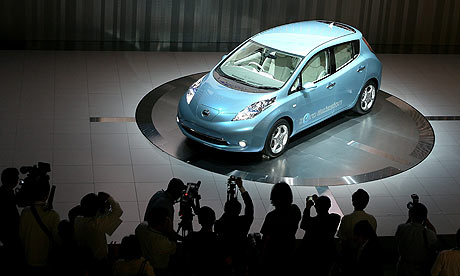Nissan unveils its electric car, the Leaf
• Sunderland in running to make five-door hatchback
• Nissan claims Leaf is first electric-only mass-market car
- guardian.co.uk, Sunday 2 August 2009 19.29 BST
- Article history

The new zero-emission electric vehicle, Leaf, during the opening ceremony of the new Nissan headquaters in Yokohama on Sunday. Photograph: Kiyoshi Ota/Getty Images
Nissan has unveiled what it claims to be the world’s first mass-market electric car — a five-door hatchback called Leaf which its Sunderland plant is vying to build for the European market.
The family-sized car, which has a maximum range of 100 miles and a top speed of about 90mph, will be in showrooms in Britain, Europe, the US and Japan by the end of next year.
The Leaf is the first of Nissan’s new range of fully electric powered cars, which produce no carbon emissions, unlike hybrid vehicles such as the Toyota Prius, which uses a petrol-powered engine as well as an electric battery. Nissan’s range of electric cars will include small, medium-sized and large saloon cars.
A Nissan spokeswoman would not disclose how much the Leaf would cost consumers, other than to say it would be similarly priced to other family-sized cars in the £10,000-£15,000 bracket. This excludes the cost of the electric battery, which drivers would have to buy at a cost of several thousands pounds, or lease for a monthly fee.
The Japanese carmaker announced last month that it had selected its Sunderland plant to make lithium-ion batteries for the European market at a new £200m factory. But the north-east plant is also bidding to make the cars. The factory is up against plants in France, Spain and Portugal also owned by Nissan and its French partner Renault.
Nissan is in discussions with the British government about what financial support could be offered because the economics of making electric cars on a large scale are unproved. The European Investment Bank has already offered the company a €400m (£340m) loan to build environmentally friendly cars in Europe but this needs to be guaranteed by the government for the UK to get a slice of production.
Business secretary Lord Mandelson has assembled a £2.3bn package of loan guarantees for the car industry but none have been extended yet, despite growing frustration from companies.
Nissan hopes that the Leaf will become the world’s first truly mass-market electric car. Unlike its Japanese rival Toyota, which makes the hugely popular Prius, Nissan is focusing its energies and investment on “pure electric” cars.
Electric cars currently on the market have a niche appeal with motorists put off by their limited range, size and speed. The tiny G-Wiz in Britain, for example, has been popular among commuters in large cities such as London, where it is exempt from the congestion charge. But even the latest model has a speed limit of only 51mph and a maximum range of 70 miles before it needs recharging, limiting its use.
High performance electric cars are prohibitively expensive. Tesla Motors, maker of the Tesla Roadster, has spent years trying to get costs down to about $100,000 (£60,000) for each sports car.
The Leaf car battery can be charged to 80% capacity in about 20 minutes, compared with almost three and a half hours needed for the G-Wiz. The first batch of cars, primarily for the Asian and North American markets, will be made in Japan and the US.
